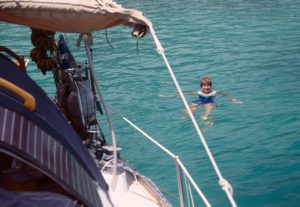Note: The following is taken in part from my memoir, Sailing with Impunity: Adventure in the South Pacific.
On-the-nose winds made the sail between American Samoa and The Kingdom of Tonga tough. After a five-month absence from sailing, my stomach rebelled. I wasn’t over-the-side sick, but for the first day and a half I didn’t feel my best.
On the second night, Bruce had gone off watch at 10:00 and settled down in Impunity’s midship bunk. I scanned the horizon and went below decks to make a cup of tea. Bruce had put the teakettle on the stove to heat the water for me, so I didn’t harness myself into the galley for the quick trip to fill my cup and grab a tea bag.
The boat surged up, then suddenly dropped off the back of a wave and threw me backwards across the cabin. I landed on the edge of the chart table, hitting my lower back, three inches from my spine on my right side.
I knew immediately I was hurt, that I’d probably broken a rib. Bruce had leapt out of the bunk with my scream as I crashed into the chart table. He wanted me to lie down right away, but I was anxious to see how badly I was hurt, so I insisted on standing my watch, with the understanding I’d call him if I needed to. Reluctantly, he agreed.
Sticking to our normal night watch routine, I set our kitchen timer for every 15 minutes and at that time did a 360-degree horizon check. I checked the knot-meter, compass, and trim of the sails, to make sure everything was okay. Because the seas were so rough, I sat tucked up under the dodger to stay out of the spray. By the 16th time I stood up on the rocking boat, I knew that nothing vital was broken. But I also knew that I was really hurting and that once I lay down, I’d probably not get up again until we arrived in Tonga.
At the end of my watch Bruce got me settled onto the bunk and that was it for me for the next day and a half, other than brief trips to the head. Keeping our regular ham radio schedule, Bruce talked to our doctor friend George on Wind-dancer in Pago Pago. I had already taken aspirin—lots of it. We had stronger pain medication on board, but I was hesitant to take it and be totally “out of it.” I knew if I had to I could get up and help Bruce. While George and Bruce talked on the radio, another person in Neiafu Harbor in Tonga chimed in, introduced himself and said he was a doctor, a fellow yachtie.
As we approached Tonga, the seas calmed allowing me to gingerly walk around, even prepare meals. Bruce was weary, having run the boat by himself and taken care of me.
We pulled into Neiafu Harbor mid-day and a customs agent came aboard first, inquiring about me. Word had spread about my injury. I was again lying on the bunk, not able to stand comfortably while the boat jostled into place at the wharf for the customs inspection. Then a doctor to whom Bruce had talked on the radio, the yachtie, came aboard and verified it was likely a broken rib, or a badly bruised one. In any event, the treatment was the same. He gave me ibuprofen, a pain medication I’d never used before, which was more effective for me than aspirin. He offered to tape my torso, but I declined. It was just too hot. He suggested that I could swim, very gently, but no diving off the boat. Not to worry. I knew diving was not in my immediate agenda.
It felt so good not to be crashing around at sea. Once we were anchored, I carefully climbed down our boarding ladder to enjoy a cooling swim. Tonga was blissfully quiet and unbelievably beautiful. It didn’t take long before I could freely move around and enjoy life in this true paradise. It was awhile longer before I could dive.



Ouch! But, but on the bright side, you got to recover in a bit of paradise. 🙂
Oh, yes. Paradise indeed. The injury wasn’t as bad as it might have been, in any event. Before we left we talked to both a doctor and a dentist and were fairly well equipped. Injuries at sea can be very serious. I was lucky.